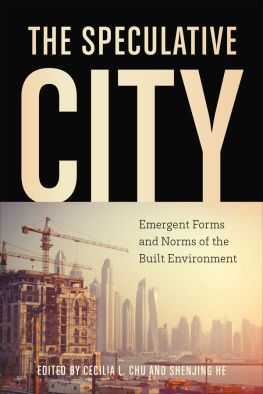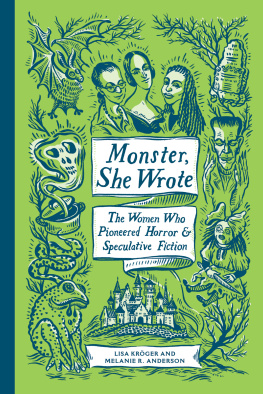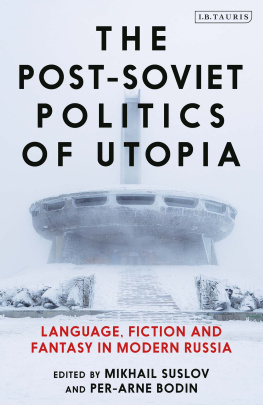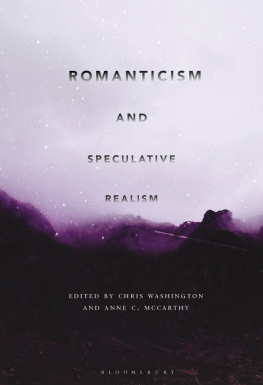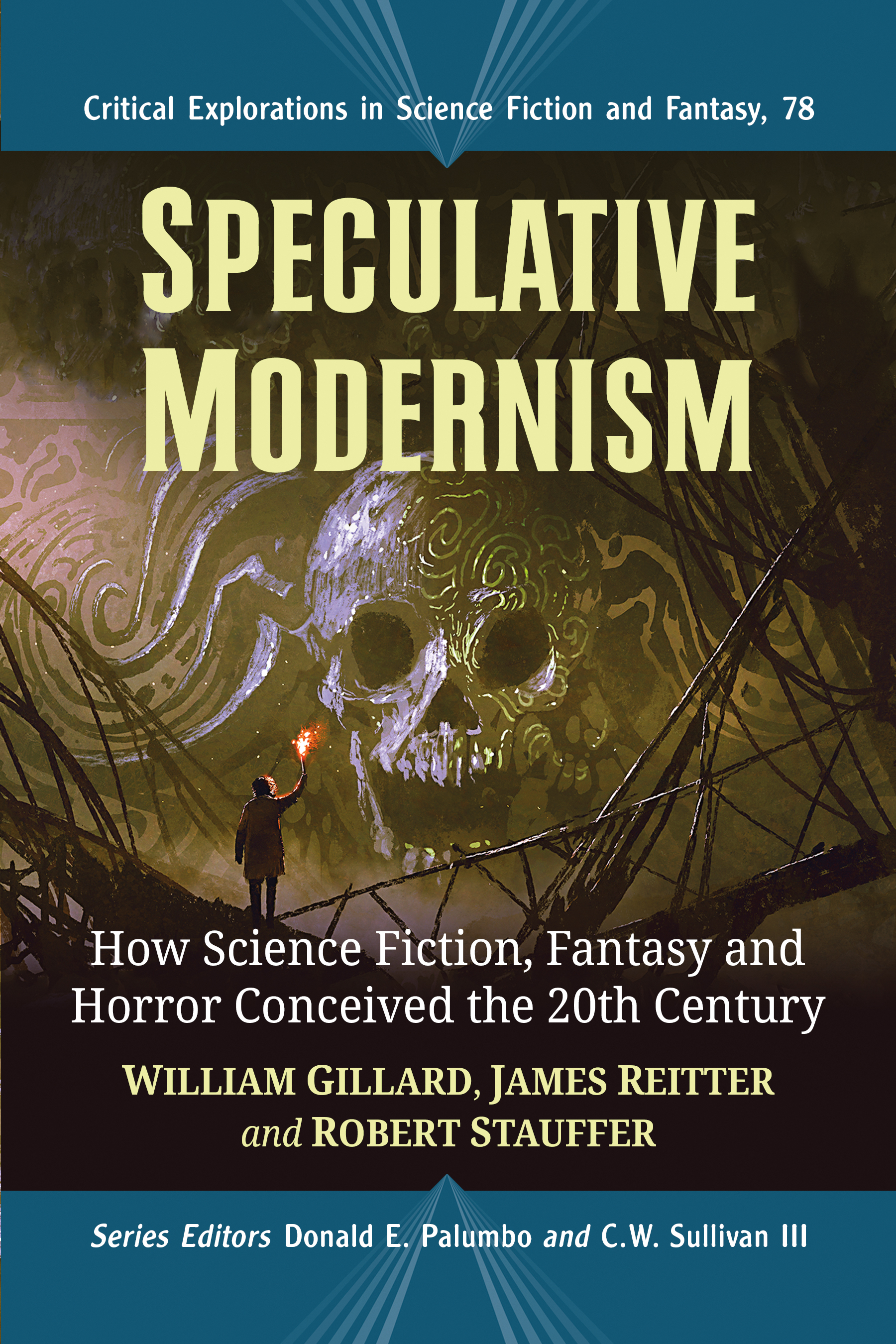Speculative Modernism
Critical Explorations in Science Fiction and Fantasy
a series edited by Donald E. Palumbo and C.W. Sullivan III
Earlier Works: www.mcfarlandpub.com
Wells Meets Deleuze: The Scientific Romances Reconsidered (Michael Starr, 2017)
Science Fiction and Futurism: Their Terms and Ideas (Ace G. Pilkington, 2017)
Science Fiction in Classic Rock: Musical Explorations of Space, Technology and the Imagination, 19671982 (Robert McParland, 2017)
Patricia A. McKillip and the Art of Fantasy World-Building (Audrey Isabel Taylor, 2017)
The Fabulous Journeys of Alice and Pinocchio: Exploring Their Parallel Worlds (Laura Tosi with Peter Hunt, 2018)
A Dune Companion: Characters, Places and Terms in Frank Herberts Original Six Novels (Donald E. Palumbo, 2018)
Fantasy Literature and Christianity: A Study of the Mistborn, Coldfire, Fionavar Tapestry and Chronicles of Thomas Covenant Series (Weronika aszkiewicz, 2018)
The British Comic Invasion: Alan Moore, Warren Ellis, Grant Morrison and the Evolution of the American Style (Jochen Ecke, 2019)
The Archive Incarnate: The Embodiment and Transmission of Knowledge in Science Fiction (Joseph Hurtgen, 2018)
Womens Space: Essays on Female Characters in the 21st Century Science Fiction Western (ed. Melanie A. Marotta, 2019)
Hailing frequencies open: Communication in Star Trek : The Next Generation (Thomas D. Parham III, 2019)
The Global Vampire: Essays on the Undead in Popular Culture Around the World (ed. Cait Coker, 2019)
Philip K. Dick: Essays of the Here and Now (ed. David Sandner, 2019)
Michael Bishop and the Persistence of Wonder: A Critical Study of the Writings (Joe Sanders, 2020)
Caitln R. Kiernan: A Critical Study of Her Dark Fiction (James Goho, 2020)
In Frankenstein s Wake: Mary Shelley, Morality and Science Fiction (Alison Bedford, 2020)
The Fortean Influence on Science Fiction: Charles Fort and the Evolution of the Genre (Tanner F. Boyle, 2020)
Arab and Muslim Science Fiction ( Hosan Elzembely and Emad El-Din Aysha, 2020)
The Mythopoeic Code of Tolkien: A Christian Platonic Reading of the Legendarium (Jyrki Korpua, 2021)
The Truth of Monsters: Coming of Age with Fantastic Media (Ildik Limpr, 2021)
Speculative Modernism: How Science Fiction, Fantasy and Horror Conceived the Twentieth Century ( William Gillard, James Reitter and Robert Stauffer , 2021)
English Magic and Imperial Madness: The Anti-Colonial Politics of Susanna Clarkes Jonathan Strange & Mr. Norrell ( Peter D. Mathews , 2021)
Speculative Modernism
How Science Fiction, Fantasy and Horror Conceived the Twentieth Century
William Gillard, James Reitter and Robert Stauffer
Critical Explorations in Science Fiction and Fantasy, 77
Series Editors Donald E. Palumbo and C.W. Sullivan III

McFarland & Company, Inc., Publishers
Jefferson, North Carolina
This book has undergone peer review.
ISBN (print) 978-1-4766-8333-1
ISBN (ebook) 978-1-4766-4495-0
Library of Congress and British Library cataloguing data are available
Library of Congress Control Number 2021045603
2021 William Gillard, James Reitter and Robert Stauffer. All rights reserved
No part of this book may be reproduced or transmitted in any form or by any means, electronic or mechanical, including photocopying or recording, or by any information storage and retrieval system, without permission in writing from the publisher.
Front cover illustration by Tithi Luadthong (Shutterstock)
Printed in the United States of America
McFarland & Company, Inc., Publishers
Box 611, Jefferson, North Carolina 28640
www.mcfarlandpub.com
To Susan, Ann, and Becky
Should the wide world roll away
Leaving black terror
Limitless night,
Nor God, nor man, nor place to stand
Would be to me essential
If thou and thy white arms were there
And the fall to doom a long way.
Stephen Crane (1895)
Acknowledgments
No book like this ever comes together without the support and sage advice of many people. The three of us agreed to meet at the Northeast Modern Language Association annual conference in 2019 to dream about a book wed write together. Wed like to thank the two people who came to our paper session that weekend to listen to us spout off about Robert E. Howard and M.P. Shiel. You were small in number, but you inspired us! It was at that conference that we first met Gary Mitchem, senior editor at McFarland. We owe him a debt of gratitude for encouraging us that day and for giving us a purpose and structure for our ideas. Wed like to thank academic librarians everywhere. Bill would especially like to thank Ane Carriveau, Kelly Johnson, and Rebecca Durbin at the UW Oshkosh Fox Cities Library for their immense help in allowing him to request every book in the world at one time or another during the writing and revision process. We could not have done it without you! Speaking of gathering the shelves and shelves of books necessary for a project of this scope, wed like to thank independent booksellers everywhere, particularly those in Dutchess County, New York, and Appleton, Wisconsin, and also Barbara and Gary Alexander of Alexander Books in Lafayette, Louisiana. Wed like to thank our families and friends for being patient with us, for being sounding boards, and for allowing us the time and space to write this book. Finally, wed like to thank our peer reviewers for taking great care in reading our manuscript closely and providing us with invaluable feedback on the content and our process. Our book is much, much better because of you fine readers.
Table of Contents
Preface
The year is 1928.
Summer.
Imagine you are a fan of science fiction and weird stories and you are sitting on your front porch waiting for the mail to arrive. Finally, there it isthe August issue of Amazing Stories is in your hands. Your parents just dont understand why you love this stuff so much. The magazine is always good, you think, but they just cant relate. At first, when you scan the table of contents, you might be interested in the new story by H.G. Wells, The Moth, a fascinating short without the social theory baggage that weighed down so much from Wells in those days. You read that story to learn of a mean-spirited public battle between rival lepidopterists that turns strange when one of them dies and the other, feeling intense guilt for how poorly he treated his late colleague, is driven insane by a strange moth that only he can see. Turn back a few pages, and youll read part one of a story you have never heard of, by two authors named Lee Hawkins Garby and Edward Elmer Smith. This was Smiths first story sale, and it changed science fiction forever. The Skylark of Space is the ur-text of the space opera genre and remains one of the most famous science-fiction series ever. Between Wells and Smith in that August 1928 issue of Amazing Stories , youll find a story called Armageddon 2419 A.D. by Philip Francis Nowlan. This story birthed perhaps the most famous science-fiction character of all time, Buck Rogers, whose popularity has endured for nearly a century. No less a figure than Donald A. Wollheim, influential author, editor, publisher, and founding member of the Futurians, said, The role of Buck Rogers in the rise and popularization of science fiction can scarcely be overestimated (Wollheim). What linked all of these stories was the intense love of science and the promise of human innovation.





